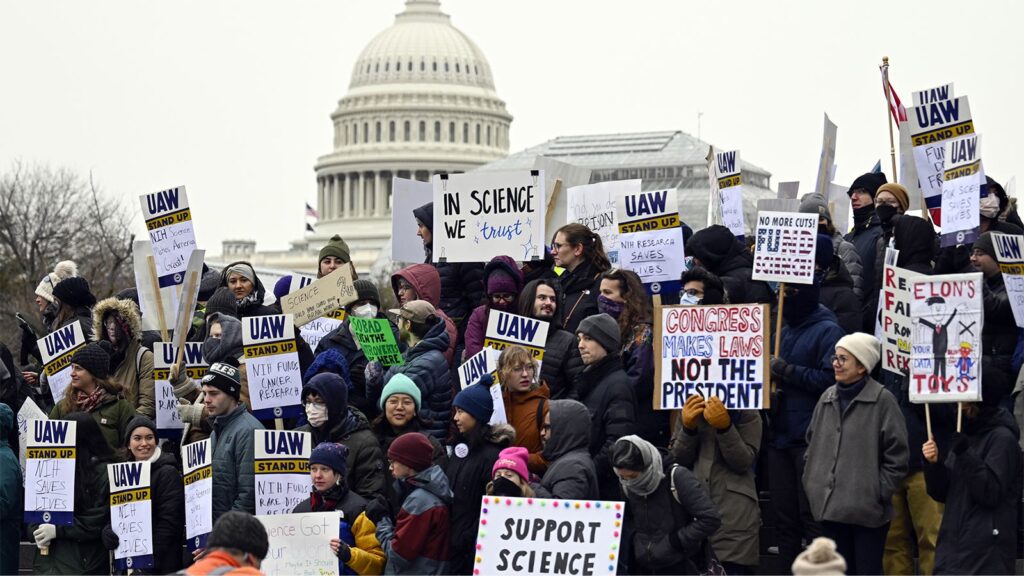BOSTON — A federal judge on Friday extended a temporary block of the Trump administration’s drastic cuts in medical research funding that many scientists say will endanger patients and delay new lifesaving discoveries.
U.S. District Judge Angel Kelley had issued a temporary restraining order earlier this month in response to separate lawsuits filed by a group of 22 states plus organizations representing universities, hospitals, and research institutions nationwide.
The new National Institutes of Health (NIH) policy would strip research groups of hundreds of millions of dollars to cover so-called indirect expenses of studying Alzheimer’s, cancer, heart disease, and a host of other illnesses — anything from clinical trials of new treatments to basic lab research that is the foundation for discoveries.
During a hearing Friday, Kelley said she was extending the temporary block while deciding on a more permanent ruling. Kelley was appointed by Democratic President Joe Biden.
“Whatever she decides, it’s not going to be the end of the story. It’s going to be appealed, probably all the way up to the Supreme Court because it’s of enormous consequence to the United States and to the rule of law,” said Lawrence Gostin, a public health law expert at Georgetown University.
The states and research groups say the cuts are illegal, pointing to bipartisan congressional action during President Trump’s first term to prohibit it.
“Yet here we are again,” attorneys argued in a court motion, saying the NIH is “in open defiance” of what Congress decreed.
Sen. Patty Murray (D-Wash.) tried unsuccessfully to block the NIH cut during an overnight Senate budget debate, saying it “violates bipartisan appropriations law. I should know, I helped author that provision. And Republicans should know — they worked with me to pass it.”
In court, Trump administration attorney Brian Lea said the issue is “broad discretion power of the executive branch” in how to allocate funds and that the government has “fully complied” with regulations. The administration also contends research groups haven’t demonstrated irreparable injury.
Not so, argued John Bueker, an attorney representing the research groups. The cuts threaten to derail scores of clinical trials of new treatments, with universities saying they’ll have to “stop or not enroll patients.”
“Let’s think about that. A clinical trial is a last hope for a lot of people,” Bueker said.
The NIH, the main funder of biomedical research, awarded more than 60,000 grants last year totaling about $35 billion. The total is divided into “direct” costs — covering researchers’ salaries and laboratory supplies — and “indirect” costs, the administrative and facility costs needed to support that work.
The Trump administration had dismissed those expenses as “overhead” but universities and hospitals argue they’re far more critical. They can include such things as electricity to operate sophisticated machinery, hazardous waste disposal, staff who ensure researchers follow safety rules, and janitorial workers.
Different projects require different resources. Labs that handle dangerous viruses, for example, require more expensive safety precautions than a simpler experiment. So currently each grant’s amount of indirect costs is negotiated with NIH, some of them small while others reaching 50% or more of the total grant.
If the new policy stands, indirect costs would be capped at 15% immediately, for already awarded grants and new ones. NIH calculated that would save the agency $4 billion a year.
Research groups offered the federal court a long list of examples of immediate harm, in blue states and red states. Among the examples, Johns Hopkins University and the University of Wisconsin, Madison, worry about seriously ill patients with no other options if they have to scale back clinical trials.
Bueker said the University of Washington might have to “euthanize valuable research animals” at its primate center.
Then there’s the impact on jobs, like 45 layoffs the University of Florida is considering and the potential loss of about 500 new jobs if construction of a new research facility in Detroit is stopped.
Please enable JavaScript to view the

